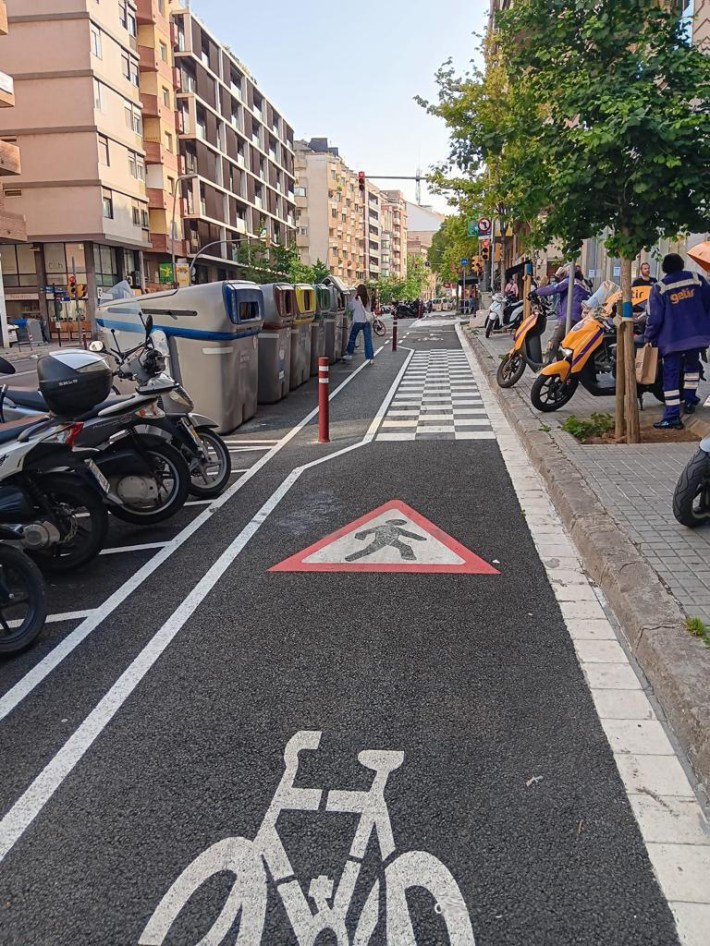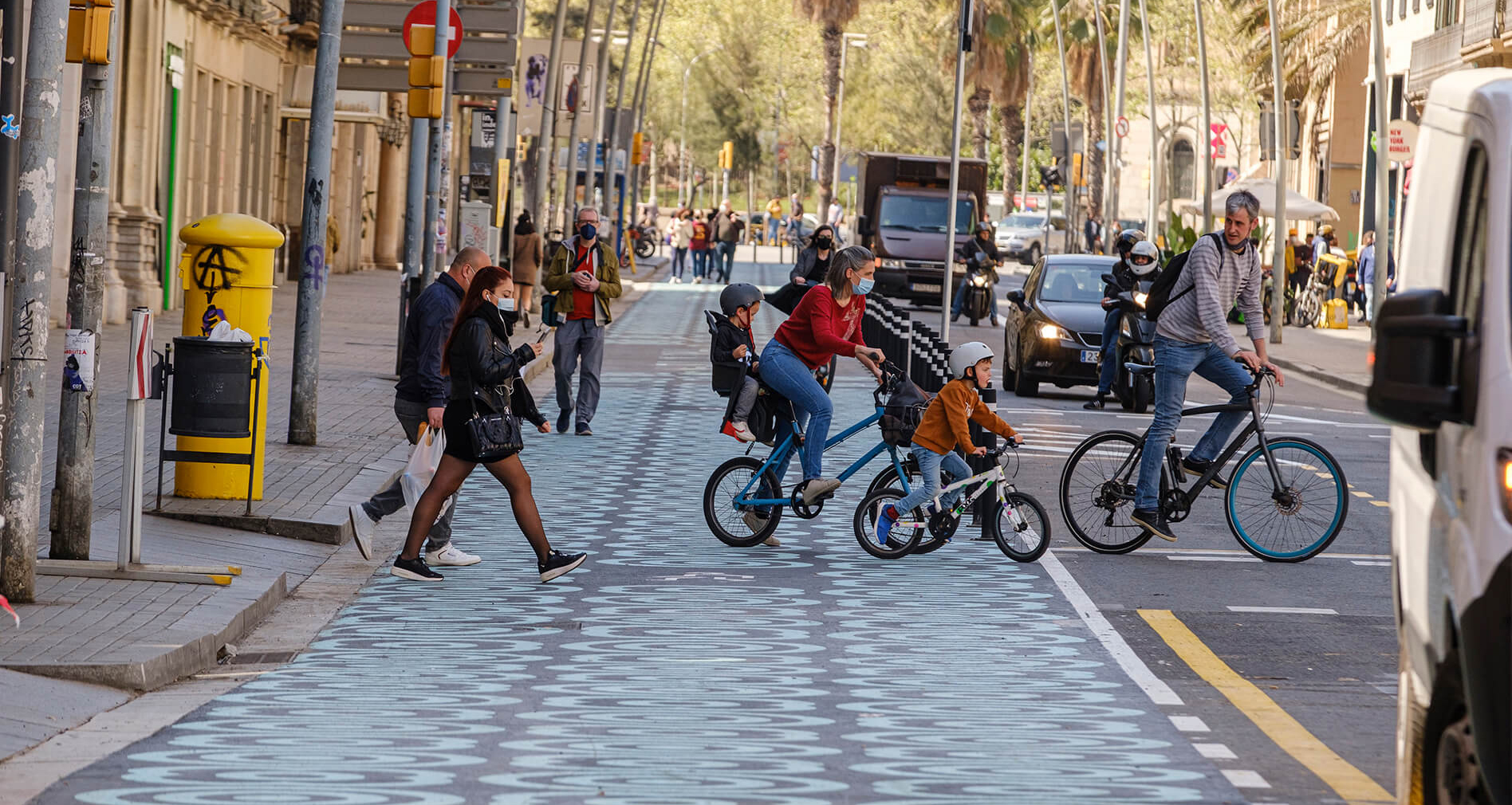Spain’s national election on Sunday delivered a surprise result after polls showed an ascendant far-right: The incumbent Socialist Party retained a small grip on power — delivering a strong rebuke to a rising tide of reaction whose agenda included attacks on climate activism and bike lanes.
The reactionary tide has manifested locally as well, including in Barcelona. The Catalan capital earned global reputation in recent years for reclaiming streets for people, but those victories are under threat. A more conservative city government recently took power — and the new mayor has expressed willingness to rip up a controversial new bike lane in the wealthy Sarria neighborhood.
Streetsblog sat down with two cycling advocates from Barcelona on Monday, the day after the election, to discuss their strategies for combating “bikelash.”
Marta Masats is a longtime Barcelona environmental activist. Berta Vazquez Prat is a parent leader in the same neighborhood who helped organize a local bi-weekly “bike-bus” that allows kids to ride safely to school. Our conversation has been edited for length and clarity.
Streetsblog: To give our readers as sense of what we’re talking about here, tell me, what was Barcelona like to bike around 30 or 40 years ago, what’s it like today, and what changed?
Marta Masats: Thirty, 40 years ago, I didn’t bike around Barcelona. It was super tough, very tough. There were no bike lanes. In fact, the other day, in the newspaper, a photograph appeared of the first “pirate” bike lane. It was 40 years ago on Passeig de Gràcia, one of the main streets in Barcelona — a very hip, tourist street. They just painted the bike lane. My partner, he biked with a carbon-filter mask then, because the city was so polluted. People all thought he was crazy. There were very few people biking in the city 40 years ago.
Berta Vazquez Prat: I remember when I was at the university, almost 25 years ago ... it was you biking in the middle of the cars. Now, you have a lot of bike lanes in many of the areas of the city. At the beginning they were all in the sidewalk, now this is changing. They are are starting to take some space from the cars. We’re starting to have decent bike lanes. Some of them are wide enough to cycle with a little bit of security. There’s also many areas, particularly ours, where we don’t have a lot of bike lanes.
Streetsblog: What is the Via Augusta bike lane? How old is it and why is it now in danger?
Marta: Just before the pandemic, we formed a platform of family associations and neighborhood associations and asked for a bike lane on the Via Augusta — because under the Via Augusta is a train that comes from from other cities in the metropolitan area and goes to the center of the city. It’s the natural way to bike into the center of the town.
We asked for this because we are in a climate emergency. Sarria, our neighborhood, has the biggest density of schools and hospitals in the city. Polluted air affects health and the cognitive abilities of the children. So, you know, two-plus-two equals four — we must have a bike lane, that’s it.
Berta: There’s also a chronic deficit in infrastructure in our area. It’s a rich area as well. It’s the place in Barcelona with the highest density of cars per family. They didn’t want to change the street because it would affect people with high income.

Marta: It’s a tough place to fight for these kinds of ecological things. My son always tells me, "What are you doing? You’re doing a revolution with a bike lane? Where are you going? This is so small, no? It’s so stupid to waste your time in a bike lane.” But it’s not only this, it’s a way to change a city. It’s not just a bike lane; it’s something more. Half of the project is funded with money from Europe, so this is kind of untouchable. The other half is the outcome of a participation process. It’s this half that’s more in question because it’s cheaper to remove than the European funded half. The European half already opened two weeks ago, the other one finished construction weeks ago but remains closed to the public. Last week we held a demonstration, opened the bike lane, and rode on it, but the Metropolitan Police closed it again.
Streetsblog: What provoked this new opposition to the bike lane?
Berta: We have some popular radio stations in Barcelona that have daily discussions about what is going on in the city. An important journalist on one of these radio stations, he used to come from the periphery by car from his house and park in front of the radio station. He’s been against this bike lane for months. We’ve been trying to see if they would invite us to give our perspective, but the power of the media is very strong against the bike lane — about the traffic, etc.
And then we have lobbies against the bike lane because we are touching a lot of privileges. We have some companies that mostly focus on car insurance. I think they’re changing slowly to incorporate these new ways of transportation in the city, but still, they are against the bike lane. They are proposing to erase it and change the speed of the street from a 50 kilometer per hour to 30.
Marta: This area is one of the richest in the city, so when the media has published articles against the bike lane, many people buy their arguments. There’s also a cultural change. People are very used to using the car, because they have it underground parking in the same place where they live. They have parking so it’s very easy for them to take the car to the center of the city. It’s very cultural.
Via Augusta is the main entrance to the city of Barcelona. It feeds into a privately-run tunnel. The bike lane takes away 33 percent of the car lanes. We have narrowed the entrance to Barcelona. There’s a lot of people are complaining about it, and, I think, a lot of companies are complaining. When you touch private enterprise, they will increase their lobbying against you.
Berta: The parties that win in this part of the city are right-wing, either Spanish or Catalan. If you look at their programs in terms of mobility, they’re very very poor.
Marta: Mobility is not an issue for these right-wing parties.
Streetsblog: But it’s actually a center-left mayor who is threatening to remove the bike lane. So these oppositional ideas do appear to have wider salience. We’ve had similar issues here, where the city will spend two years planning changes for a street, then reverse course as soon as businesses come out in opposition.
How should we respond to these periods of reaction, when suddenly these victories that we’ve won are about to win seem threatened?
Berta: We need to make our claims more transversal. Before the election we tried to meet with all the parties and try to explain our needs. The left parties of course take our ideas, but this year we also met with one of the right parties, which was a good start. We want cycling to be in the program of every party in some capacity.
We were very scared because the extreme right was on the rise here in Spain, denying climate change and calling for the removal of bike lanes. After Sunday's general election, in which the right dropped dramatically. I’m more optimistic than I was.
Marta: The bike bus has invented a new right, which is that children can go to school by bike. This is a new right. This is a right you have to put in value. A child of 10 has to be able to go by bike to school. Full stop. Mobilization is very important. We have to be in the streets.
Another very important thing, I think, is data. Data data data. Not only data about the use of bikes, but also data that shows pollution’s impact on health and children, the noise. I mean, if we want cities for humans, only data can throw these stupid right-wing arguments against the bikes lane or climate change. Scientific data, journals, data, studies, reports. I’m not a cyclist activist. I don’t consider myself a cyclist activist at all, but I want to see a clean city, a safe city, and a feminist city — and bikes are are way to change cities in a way that they are more livable.
Streetsblog: Tell us about that mobilization. Maybe you can inspire us.
Berta: When we started the bike bus in 2021, and in Via Augusta specifically in 2022, we did some training with the police on how to ride with the kids. The day before our first ride we received a notification saying that it was not safe and telling us to wait for more training. We did our it anyway, and it was amazing. Everybody was super excited.
The local government, they said we shouldn’t do that, that we should wait a year-and-a-half for the bike lane to open. Because we didn’t have the support of the local government, we started our bike bus as a protest, every Monday and every Friday for the entire school year. I think in the U.S., the police relationship is different from here. The relationship with the local government and police improved over three months, and now we have police come with us to protect the kids. It’s no longer a protest.
Their initial suggestion was that we abandon the bike bus. We decided to keep going, that we had to do it. It was scary at the beginning, but it was successful in the end.
Marta: Every time or every occasion that the local government or the district government offers a place that you can participate, participate. We are going to do this in the future, since the bike lane is under threat. I’m part of another group asking for a bike lane inside the tunnel.
We took a group and did something like Critical Mass, and went biking through the tunnel. The tunnel gets closed, the police come. Last time, in April, we got caught and 13 of us, including me, we had to pay a €200 fine. I can get a fine, no problem. Either I pay it or we crowd-fund, but there’s a risk.
Here in Catalonia, we have practice getting mobilized because of the independence process and all that. We have learned a lot of things. If you mobilize in any way, you have to assume personal risk. What's the worst that can happen, you get a fine? Who cares? Money is money. It’s something you have to balance. It’s very personal.
Inici de la bicicletada d'aquesta tarda.
— Plataforma Bici Augusta (@AugustaBici) July 19, 2023
DEFENSEM EL CARRIL BICI DE LA VIA AUGUSTA!!!!! pic.twitter.com/ITWTH7KP9F






